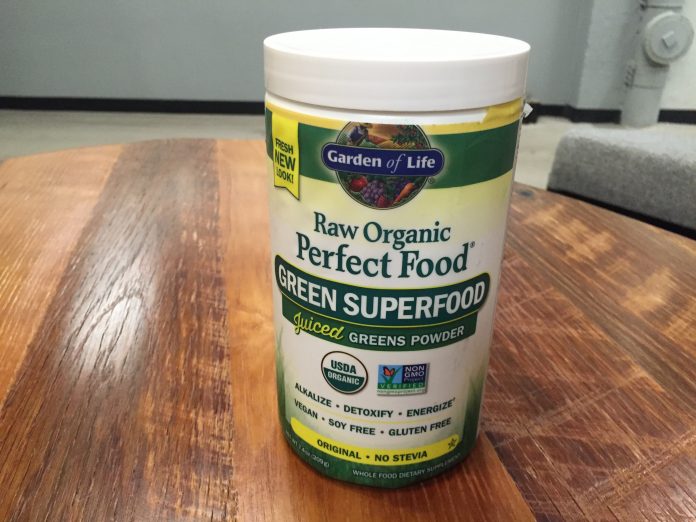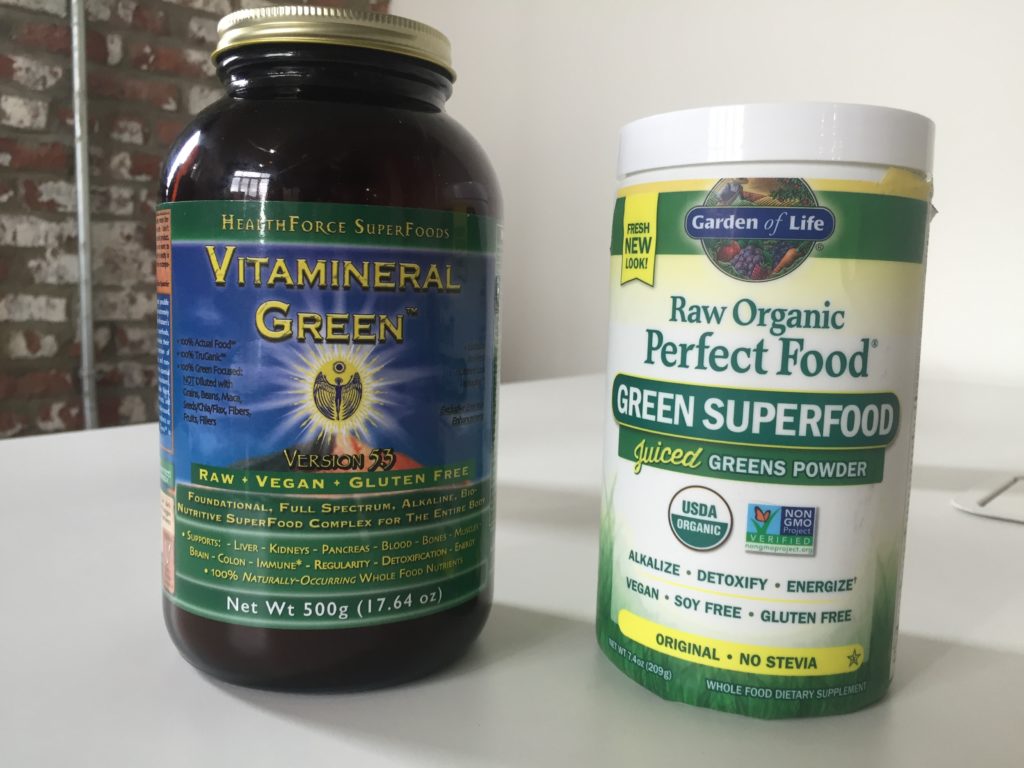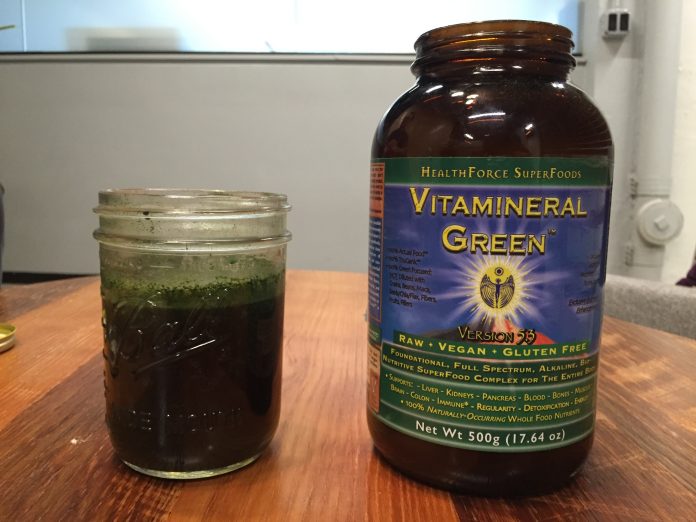These two green superfood drinks have a lot in common: they’re both proudly raw vegan, they taste pretty similar, and they’re packed with grasses and probiotic bacteria.
But they also have a lot of differences: one has five kinds of sea vegetables, the other doesn’t. One has a wide variety of fruit, the other doesn’t. And they’re also marketed quite differently; while they both have a granola, New Age-y vibe, Vitamineral Green uses a lot more unusual terms, like claiming the product can enhance your “vibrational energies.”
It makes sense to compare the two. What we found was a little surprising.
Check out our rankings of the best greens powder here!
Taste
Vitamineral Green
These two products are pretty similar in taste: there are no artificial flavors or sweeteners and no added natural sweeteners either. The result is a couple of very grassy greens powders.
Vitamineral Green is grassy and bitter, and because it contains a lot of algaes like spirulina and chlorella, it tastes a little like seaweed as well.
Perfect Food
The taste is similar, but Perfect Food doesn’t contain sea vegetables and it’s just a tiny bit sweeter and nuttier, probably because it contains more fruit and sprouts than Vitamineral Green.
Neither taste amazing, but Perfect Food goes down more easily. You should also note that Garden of Life is available in apple and chocolate flavors, so you have more options when it comes to taste than Vitamineral Greens.
Winner: Perfect Food
Price
Vitamineral Green
On Amazon, you can find a 500 gram jar of Vitamineral Green for 58 dollars, or $1.16 per serving. That’s relatively inexpensive for a greens powder that offers grasses, algae, probiotics, and digestive enzymes.
Perfect Food
At about $23 for 30 spoonfuls, Perfect Food winds up 76 cents per serving. That’s really cheap, particularly since it provides a decent array of vitamins and minerals along with the probiotics and grasses.
Winner: Perfect Food

Ingredients
Vitamineral Green
Both contain probiotic bacteria and raw, mostly organic ingredients with wheat grass, barley grass, and oat grass, but Vitamineral Green is different for a few reasons.
Firstly, it contains several varieties of algae, which Perfect Food doesn’t. It also has more kinds of probiotic bacteria than Perfect Food (six versus three). It also has eight kinds of sea vegetables, from the common spirulina and chlorella to the unusual like bladderwrack and alaria.
And here we get to the defining quality of Vitamineral Green: weird ingredients. You won’t find normal fruits and veggies like apple and spinach (which are present in Perfect Food), but you’ll find unusual plants like amla berry, shilajit, and chickweed herb. There’s also barley grass, moringa leaf, and holy basil, which are a little more common.
A lot of these ingredients have been used in traditional Ayurvedic medicine, traditional Chinese medicine, and North American herbal medicine. If you’re a fan of that kind of stuff, you’ll be happy with Vitamineral Green.

Perfect Food
Perfect Food has a wide variety of digestive enzymes, particularly compared to Vitamineral Green (which has none). It also has a cool blend of sprouted grains and seeds, and an ingredients list that’s both longer than Vitamineral Green and full of more common ingredients.
We’re talking apple, brussels sprouts, berries, cauliflower, and asparagus, along with popular seeds like flax and grains like buckwheat and millet.
Those are the main differences. It’s tough to pick a winner with the ingredients; Vitamineral Green has a lot more ingredients that are harder to find, while Perfect Food has a lot more ingredients you’re likely to be looking for. Since we’re speaking to a wide audience — and since Perfect Food contains more ingredients and more enzymes — I think Perfect Food has a better ingredient profile. Plus, it’s completely organic, while Vitamineral Green is only partially organic.
Winner: Perfect Food
Benefits and Effectiveness
Vitamineral Green
The biggest problem with Vitamineral Green is that it lacks transparency; there’s very little nutritional information on the label. It claims to contain a “full spectrum of vitamins, minerals, amino acids, antioxidants, chlorophyll, and phytonutrients,” but there’s no proof.

The nutrition label says it contains 60 percent of your recommended daily intake of Vitamin A, 20 percent of your daily Vitamin C, 40 percent of your iron (that’s a lot), 10 percent of your calcium, and 1 percent of your sodium.
We don’t know if it has any other vitamins or minerals, we don’t know how potent its antioxidant content is, how much chlorophyll it has, we don’t even know how many probiotic bacteria it has.
It does have a lot of ingredients that will appeal to New Agey types, and that may be enough for them. But we think if a product claims to contain a full spectrum of vitamins and minerals, it should include the vitamin and mineral content on the label.
Perfect Food
Perfect Food isn’t perfect; it doesn’t mention its antioxidant content either, despite the fact that almost half of the product’s content by weight is an “antioxidant blend.”
That said, it has a more expansive nutrition panel: there’s 40 percent of the recommended daily intake of Vitamin C, 110 percent of your daily Vitamin K, 20 percent of your manganese, the 10 percent of your riboflavin (Vitamin B2) and 10 percent of your iron. So while it’s lower in iron and Vitamin C than Vitamineral Green, it provides more evidence of a well-rounded product.
In addition, it tells you how many probiotics it has — 1.2 billion. That’s not a lot, but it tells you what’s in it.
Because of its transparency and it’s broader array of ingredients, Perfect Food comes out on top for benefits.
Winner: Perfect Food
Overall Winner: Perfect Food
It’s true that a lot of folks prioritize spirulina in their greens powders, so if you’re looking for algae or you’re looking for unusual herbal medicine ingredients, Vitamineral Green might be the best pick for you.
But for the general population that wants a lot of fruits, veggies, probiotics, and enzymes from their superfood greens powder, Perfect Food makes more sense — and it’s a lot cheaper, too.